PEOPLE OF ACTION

THE FIRST HALF OF THE 20th CENTURY
CONTENTS
 Great Britain Great Britain
 France France
 Germany Germany
 Italy Italy
 Spain Spain
 Russia
/ The Soviet Union Russia
/ The Soviet Union
 The Vatican The Vatican
 Other
European Other
European
 The
United States The
United States
 India India
|
|
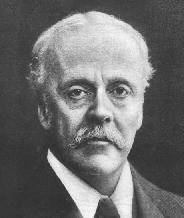 Arthur James Balfour (1902-1919)
Arthur James Balfour (1902-1919)
1848-1930. Prime Minister, 1902-1905.
Chief Secretary for Ireland, 1887-1892.
First Lord of the Treasury, 1891-1892. Leader of the Conservative
Opposition, 1892-1895. First Lord of the Admiralty, 1915-1916.
Secretary of Foreign Affairs, 1916-1919. Chancellor of Cambridge
University, 1919.
Author of the Balfour Declaration
(November 2, 1917) whereby Britain recognized the right of the Jews to
establish a national homeland in Palestine – though supposedly in such a
way that it would not adversely affect the  non-Jews already living in the
area (?!). non-Jews already living in the
area (?!).
 Balfour's
major works or writings: Balfour's
major works or writings:
Defence of the Philosophic
Doubt (1879)
The Foundations of Belief
(1895)
Theism and Thought
(1923)
Henry Campbell-Bannerman
(1905-1908)
1836-1908. Liberal Party.
British Prime Minister, 1905-1908.
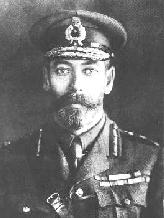 George
V (1910-1936) George
V (1910-1936)
1865-1936. Son of Edward VII.
King of England, 1910-1936.
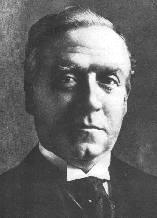 Herbert
Henry Asquith Herbert
Henry Asquith
1852-1928. Liberal Party.
British Prime Minister (1908-1916)
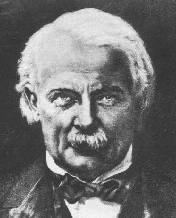 David
Lloyd George (1916-1922) David
Lloyd George (1916-1922)
Liberal Party. British Prime Minister,
1916-1922.
Bonar Law
Conservative Party. British Prime
Minister, 1922-1923.
Stanley Baldwin
(1923-1937)
1867-1947. Conservative Party.
British Prime Minister, 1923-1924, 1924-1929, 1935-1937.
James Ramsey MacDonald
(1924-1935)
Labour Party. British Prime Minister,
1924 and 1929-1935.
George VI (1936-1952)
1895-1952. Second son of George
V – and brother of Edward VIII, who abdicated the throne to him in 1936.
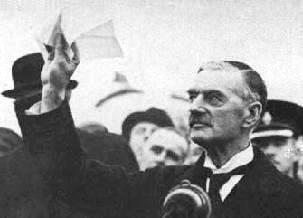 Neville
Chamberlain (1937-1940) Neville
Chamberlain (1937-1940)
Arthur Neville Chamberlain. 1869-1940.
Prime Minister, 1937-1940.
 Winston
Churchill Winston
Churchill
1874-1965. Prime Minister, 1940-1945
and 1951-1955.
Took over the prime-ministership
during the dark hours of the "Battle of Britain" (summer of 1940) – as German
bombers attempted to lay waste to English industrial cities in preparation
for a Nazi invasion. Also during the summer of 1940, he negotiated
a secret agreement with US President Roosevelt to receive a number of American
battleships (destroyers) – in exchange for American rights to military bases
in British territories overseas.
 Field
Marshall Bernard Law Montgomery ("Monty") (1942-1945) Field
Marshall Bernard Law Montgomery ("Monty") (1942-1945)
1887-1976.
He rallied a retreating and demoralized
English Army in North Africa – and at the battle of El Alamein in Egypt
(November 1942) his English forces defeated the Germans under General Erwin
Rommel, turning the tide in favor of England and against Germany in North
Africa. In 1943 he pursued the Germans westward across North Africa,
captured Tunisia and from there crossed the Mediterranean into Italy.
He led his English 8th Army step by step up the Eastern coast of Italy – until
he was returned to England to become part of the leadership of the Allied
invasion of Normany in June 1944.
Clement Richard
Attlee
1883-1967. Prime Minister, 1945-1951.
He was head of the Labour Government
which nationalized a large number of major British industries at the end
of World War II. He also presided over the dismantling of key parts
of the British Empire (Palestine, India). |
|
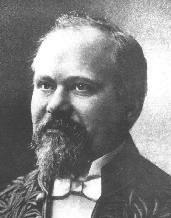 Raymond
Poincaré Raymond
Poincaré
President of the Republic of France.
Georges
Clemenceau (1906-1920)
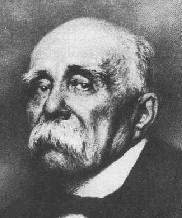
1841-1929. Premier of France,
1906-1909 and 1917-1920.
Chairman of the Versailles Peace
Conference – and a determined advocate of the policy of keeping post-War
Germany weak. He demanded as war reparations imposed on Germany the
granting to France of the west-bank area (Alsace) of the Rhine and the
coal producing Saar Basin.
Rebuffed by Wilson who was afraid
that this would only plant new seeds for future conflict with Germany,
the French were indeed granted Alsace, but only 15-year occupational rights
in the Saar – plus a German guarantee of the demilitarization of the entire
German Rhineland region (which Hitler violated in 1935).
At age 24 Clemenceau escaped to America
to avoid the regime of Napoleon III – working for 4 years in the States
as a journalist and teacher and then returning to France in 1869.
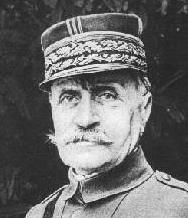 Marshal
Ferdinand Foch Marshal
Ferdinand Foch
Commander of the allied armies of the
Entente (Britain, France, Russia)
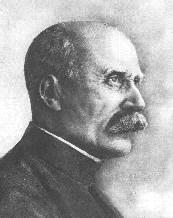 Marshal
Henri Pétain ( -1944) Marshal
Henri Pétain ( -1944)
Henri Philippe Omer Pétain.
1856-1951. Marshal of France. Premier of the Vichy government,
1940-1944.
|
|
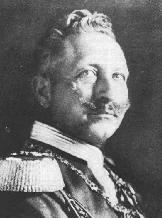 Wilhelm
II (1888-1918) Wilhelm
II (1888-1918)
1859-1941. King of Prussia and
Emperor (Kaiser) of Germany, 1888-1918)
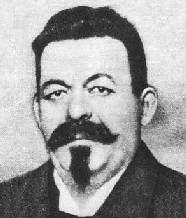 Friedrich
Ebert (1919-1925) Friedrich
Ebert (1919-1925)
(1871-1925)
Head of the German Social Democratic
Party and the political leader who helped Germany formulate the democratic
Weimar Constitution after World War One. He was President of the
Weimar Republic from 1919 to 1925.
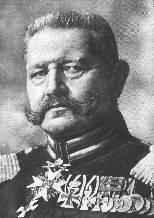 Paul
von Hindenburg (1925-1934) Paul
von Hindenburg (1925-1934)
Paul von Beneckendorff und von Hindenburg.
1847-1934. Field Marshal. President of the Weimar Republic
of Germany, 1925-1934.
 Adolph
Hitler (1933-1945) Adolph
Hitler (1933-1945)
1889-1945. Austrian-born Chancellor
of Germany, 1933-1934. Dictator ("der Fuhrer") of Germany, 1934-1945.

 Hitler's
major works or writings: Hitler's
major works or writings:
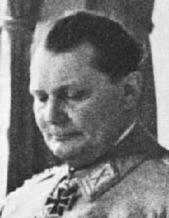 Hermann
Wilhelm Göring Hermann
Wilhelm Göring
1893-1946. German Field Marshal.
Nazi party leader.
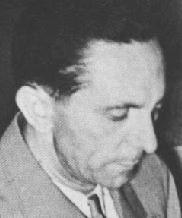 Josef
Paul Goebbels Josef
Paul Goebbels
1897-1945. Director of Nazi propaganda.
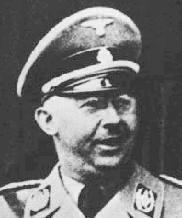 Heinrich
Himmler Heinrich
Himmler
1900-1945. Chief of the S.S. (Schutzstaffel) – Hitler's
personal body guard and secret police – loyal only to the person of Hitler
himself.
Albert Speer
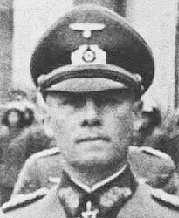 Field
Marshal Erwin Rommel Field
Marshal Erwin Rommel
1891-1944.
German field marshal in command of
the German Army (Wehrmacht) in North Africa. Earned the title "Desert
Fox" because of his demonstrated talents as a military strategist. |
|
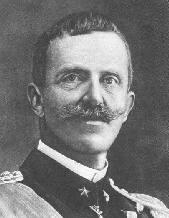 Victor
Emmanuel III (1900-1946) Victor
Emmanuel III (1900-1946)
1869-1947. King of Italy, 1900-1946.
Vittorio Orlando
1860-1952. Premier of Italy, 1917-1919.
As leader of the Italian delegation
to the post-War Paris peace discussions, he attempted to press Italian
claims for lands promised in 1915 by England to Italy along the eastern
Adriatic coast within the enemy Austro-Hungarian Empire.
US President Wilson instead stood
firm in the granting of these lands to the newly created Yugoslavia.
Orlando resigned from his premiership in anger at this rebuff.
He later became a supporter of Mussolini – until
the two had a political split in 1925 and he resigned from the Italian
Parliament.
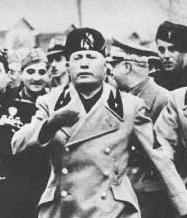 Benito
Mussolini (1922-1943) Benito
Mussolini (1922-1943)
1883-1945. Dictator ("Il Duce")
of Italy, 1922-1943. |
|
 Francisco
Franco (1939- ) Francisco
Franco (1939- )
Paulino
Hermenegildo Teodulo Franco-Bahamonde. 1892- . Chief of State
1939-1947; Co-regent of the Kingdom of Spain, 1947
|
RUSSIA
/ THE SOVIET UNION |
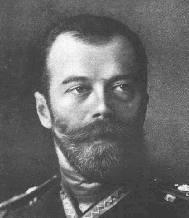 Nicholas
II (1894-1917) Nicholas
II (1894-1917)
1868-1918. Emperor (Tsar) of Russia,
1894-1917.
Pyotr Stolypin
(1906-1911)
Russian Prime Minister who undertook
vast agricultural reforms to improve the life of the peasants and who attempted
stronger cultural Russification of the non-Russians within the empire.
In the end he succeeded in alienating
all political groupings with his dictatorial manner and was assassinated
on September 14, 1911.
 Vladimir
Ilyich Lenin (1917-1924) Vladimir
Ilyich Lenin (1917-1924)
1870-1924.
 Lenin's
major works or writings: Lenin's
major works or writings:
Materialism and Empirio-Criticism(1909)
State and Revolution
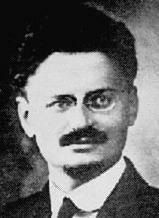 Leon
Trotsky (1879-1940) Leon
Trotsky (1879-1940)
Lev Davidovich Bronstein. Created the
Soviet Red Army. Served as the Soviet Commissar or Minister of Foreign
Affairs, 1918-1925. Expelled from the Soviet Union in 1929 under
orders from Stalin. He now turned his mighty pen against Stalin and
his "betrayal" of the Bolshevik Revolution. In 1940 he was silenced
by an assassin in Mexico City.
 Trotsky's
major works or writings: Trotsky's
major works or writings:
War
and the International (1914)
Pacifism
as the Servant of Imperialism (1917)
The
New Course (1923)
The
Lessons of October (1924)
The
History of the Russian Revolution (1930)
The
Rise of Hitler and Destruction of the German Left (1930)
Their
Morals and Ours (1936)
The
Revolution Betrayed (1936)
Trotsky
in Norway (1936)
Stalini
sm and Bolshevism
(1937)
 Joseph
Stalin (1922-1953) Joseph
Stalin (1922-1953)
Josif Vissarionovich Dzhugashvili. 1879-1953.
Communist Party General Secretary, 1922-1953.
Vyacheslav Mikhailovich
Molotov
(1890- ) Commisar of Foreign Affairs,
1939-1949 and 1953-1956.
|
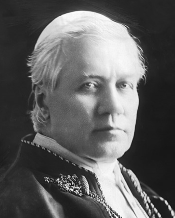 Pius X (pope: 1903-1914) Pius X (pope: 1903-1914)
Giuseppe Melchiorre Sarto (1835-1914).
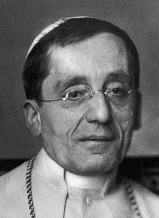 Benedict XV (pope: 1914-1922) Benedict XV (pope: 1914-1922)
Giacomo Paolo Giovanni Battista della Chiesa (1854-1922).
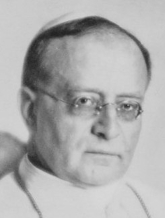 Pius XI (pope: 1922-1939) Pius XI (pope: 1922-1939)
Ambrogio Damiano Achille Ratti (1857-1939).
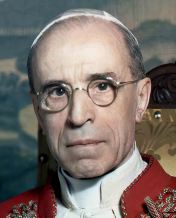 Pius XII (pope: 1939-1958) Pius XII (pope: 1939-1958)
Eugenio
Maria Guiseppe Giovanni Pacelli (1876-1958). Italian of
aristocratic origins (and well-placed family in the church hierarchy)
who served as papal representative to various European monarchs, to the
newly established Soviet Union ... though most importantly to Weimar
Germany. Then as the pope’s Secretary of State (1930) he would be
responsible for the Vatican’s foreign policies. He would
eventually (1933) be responsible for establishing the Catholic Church’s
Reichskonkordat with Germany (protecting the rights of the Catholic
Church in an increasingly secular Germany). He would also set up
similar treaties with other European nations: Austria (1933),
Yugoslavia (1935), and Portugal (1940).
During the war, now serving as pope, he worked to keep the papacy
neutral ... pleasing neither side and bringing him much criticism after
the war. He was accused of turning a blind eye to the Jewish
holocaust. But in fact he had those working under him (Roncalli,
for instance) working at the problem. And Pius apparently had
links to the German Resistance during the war.
After the war he was a very strong voice in opposition to the
persecution and deportation of Catholic priests by the Communist
governments in Soviet-controlled East Europe.
He also confirmed the concept of the Immaculate Conception, the sinlessness, and the bodily Assumption
|
Eamon
de Valera (1882-1975)
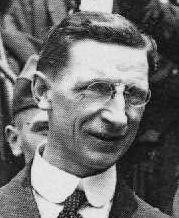
1882-1975.
Taoiseach (prime minister) of the
Irish Free State, 1932-1948. Then President of the Irish Republic,
1959-
In 1926 de Valera founded the Fianna
Fail, a Irish republicanist political party which very reluctantly agreed
to a compromise on the division of Ireland between 1) the Catholic and
Republicanist southern counties and 2) the heavily Protestant and Unionist
northern counties of Ulster.
De Valera originally was a strict
opponent of the 1921 Anglo-Irish treaty with England which set up both
the Irish Free State and the Ulster Union under the English monarchy.
De Valera was an ardent Republicanist – and took that side in the bitter
civil war (1922-1923) in Ireland between the pro-treaty Irish Free Staters
and the anti-treaty Irish Republicanists. In the end the Republicanists
lost the civil war among the Irish.
De Valera's Fianna Fail was created
in 1926 to draw forward the Republicanist partisans. At the same
time de Valera himself began to press the Irish Republicanists to accept
some kind of compromise with political reality – and come to learn to live
with the treaty.
In 1932 he and his party were elected
to a majority in the Irish Dail (parliament). Now as Taoiseach, he
began step by step to undo some of the features of the Anglo-Irish treaty
hated by the Republicanists. He no longer continued to swear the
oath of allegiance to the British crown, he abolished the office of British
governor-general in Ireland – and in 1937 he extended to the Irish a new
constitution.
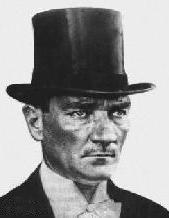
Mustafa
Kemal Atatürk (1923-1938)
1881-1938. President of Turkey,
1923-1938.
Considered the "Father" of modern
Turkey. Successful Turkish general during World War One – having led
the Turkish defense against the British at Galipoli. "Deliverer"
of Turkey from the Greeks in the Greco-Turkish War immediately following
World War I. |
|
Mohandas "Mahatma" Gandhi (1867-1948)

Inspirer of Indian independence from
British rule, using satyagraha or "soul force" to undermine the
British position in India politically, economically, culturally, and spiritually.
He was assassinated in 1948 in the
midst of a general breakdown of law and order following the withdrawal
of British rule.
His techniques of satyagraha
were studied around the world by other liberationists in the hopes that
they might be applied elsewhere to collapse Western imperial rule and institute
local self-rule. The African National Congress in South Africa attempted
to use his methods to oppose
apartheid or State-sponsored segregation
in that country during the 1950s. Martin Luther King, Jr. studied
them as a technique for ending White monopoly of power in the American
South during the 1960s.
|
Sun Yat-sen (1911-1925)
Chiang
Kai-shek (1928-1975)

Emperor Michinomiya
Hirohito (1926-1989)
1901-1989.
Emperor, 1926-1989.
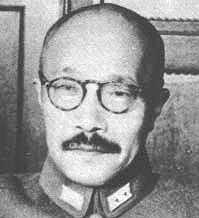
General
Tojo Hideki (1941-1944)
1884-1948.
Yamamoto
Isoroku (1941-1943)

1884-1943.
Commander of the Japanese Navy during
part of World War Two.
At first reluctant to go to war with
the United States, once the decision for war was made by the Japanese Cabinet,
Yamamoto put his full force behind the idea of crushing the United States
Navy in the hoping of forcing the US to sue for peace. He was the
one who conceived the plan of a surprise attack on Pearl Habor (December
1941) – using aircraft carriers as the main instrument of war. But
he failed to cripple the United States naval power – first losing a major
engagement with the United States Navy at Midway Island (June 1942) and
then in the subsequent struggle for control of the Solomon Islands.
In the latter battle his plane was shot down and he was killed. |
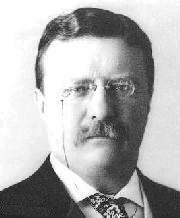 Theodore
("Teddy") Roosevelt (1901-1909) Theodore
("Teddy") Roosevelt (1901-1909)
1858-1919.
Awarded the Nobel Peace Prize in
1906.
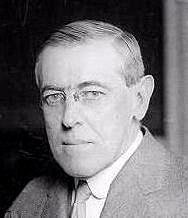 Woodrow
Wilson (1913-1921) Woodrow
Wilson (1913-1921)
Thomas Woodrow Wilson. 1856-1924.
Nobel Peace Prize, 1919.
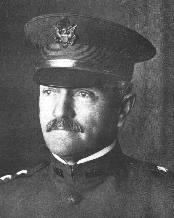 General
John J. Pershing General
John J. Pershing
Commander in Chief of the American Expeditionary
Forces (1917-1918)
Henry Ford ( -1947)
1863-1947.
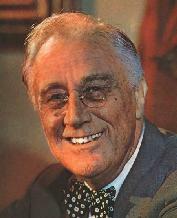 Franklin
Delano Roosevelt (1933-1945) Franklin
Delano Roosevelt (1933-1945)
1882-1945.
 General
George S. Patton General
George S. Patton
1885-1945.
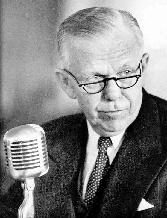 General
George C. Marshall General
George C. Marshall
1880-1959. U.S. Army Chief of
Staff, 1939-1945. U.S. Secretary of State, 1947-1949. Secretary
of Defense, 1950-1951.
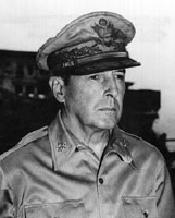 General
Douglas MacArthur General
Douglas MacArthur
1880-1964.
 Harry
S. Truman (1945-1953) Harry
S. Truman (1945-1953)
1884-
Dean
G. Acheson (1945-1953)
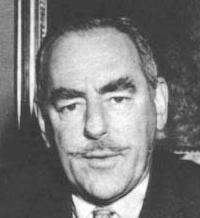
1893-1971. Under-Secretary of
State, 1945-1947 and Secretary of State, 1949-1953.
He helped to develop the US policy
in Europe of the "containment" of Communism – by extending economic and
military aid to countries under threat of a communist takeover. He
was the individual who explained before Congress in 1947 the elements of
the Truman Doctrine; he helped put the Marshall Plan into operation and
organize the NATO alliance.
In Asia he took a more aloof position
with respect to the fate of the Chinese Nationalist government of Chiang
Kai Shek – which drew considerable antipathy from the Republican conservatives
in Congress. He was also accused on leading the North Koreans into
the attack on South Korea in 1950 (the Korean War) by failing in a key
speech of his to include Taiwan and Korea in his description of the American
sphere of influence that the government stood ready to defend.
He retired in 1953 and devoted himself
to his law practice and his political writings. In 1970 he received
the Pulitzer Prize for History with his book, Present at the Creation:
My Years in the State Department.
 Acheson's
major works or writings: Acheson's
major works or writings:
Pattern of Responsibility
(1952)
A Democrat Looks at His Party
(1955)
A Citizen Looks at Congress
(1957)
Power and Diplomacy
(1958)
Sketches from Life of Men
I Have Known (1961)
Present in Creation
(1969)
|
THE FIRST HALF OF THE 20th CENTURY:
A FULL HISTORY |

Go on to the next section: The Second Half of the 20th Century
 Miles
H. Hodges Miles
H. Hodges
| | | | |



 Arthur James Balfour (1902-1919)
Arthur James Balfour (1902-1919) George
V (1910-1936)
George
V (1910-1936) Herbert
Henry Asquith
Herbert
Henry Asquith David
Lloyd George (1916-1922)
David
Lloyd George (1916-1922) Neville
Chamberlain (1937-1940)
Neville
Chamberlain (1937-1940) Winston
Churchill
Winston
Churchill Field
Marshall Bernard Law Montgomery ("Monty") (1942-1945)
Field
Marshall Bernard Law Montgomery ("Monty") (1942-1945) Raymond
Poincaré
Raymond
Poincaré
 Marshal
Ferdinand Foch
Marshal
Ferdinand Foch Marshal
Henri Pétain ( -1944)
Marshal
Henri Pétain ( -1944) Wilhelm
II (1888-1918)
Wilhelm
II (1888-1918) Friedrich
Ebert (1919-1925)
Friedrich
Ebert (1919-1925) Paul
von Hindenburg (1925-1934)
Paul
von Hindenburg (1925-1934) Adolph
Hitler (1933-1945)
Adolph
Hitler (1933-1945)
 Hermann
Wilhelm Göring
Hermann
Wilhelm Göring Josef
Paul Goebbels
Josef
Paul Goebbels Heinrich
Himmler
Heinrich
Himmler Field
Marshal Erwin Rommel
Field
Marshal Erwin Rommel Victor
Emmanuel III (1900-1946)
Victor
Emmanuel III (1900-1946) Benito
Mussolini (1922-1943)
Benito
Mussolini (1922-1943) Francisco
Franco (1939- )
Francisco
Franco (1939- ) Nicholas
II (1894-1917)
Nicholas
II (1894-1917) Vladimir
Ilyich Lenin (1917-1924)
Vladimir
Ilyich Lenin (1917-1924)
 Leon
Trotsky (1879-1940)
Leon
Trotsky (1879-1940) Joseph
Stalin (1922-1953)
Joseph
Stalin (1922-1953) Pius X (pope: 1903-1914)
Pius X (pope: 1903-1914) Benedict XV (pope: 1914-1922)
Benedict XV (pope: 1914-1922) Pius XI (pope: 1922-1939)
Pius XI (pope: 1922-1939) Pius XII (pope: 1939-1958)
Pius XII (pope: 1939-1958)




 Theodore
("Teddy") Roosevelt (1901-1909)
Theodore
("Teddy") Roosevelt (1901-1909) Woodrow
Wilson (1913-1921)
Woodrow
Wilson (1913-1921) General
John J. Pershing
General
John J. Pershing Franklin
Delano Roosevelt (1933-1945)
Franklin
Delano Roosevelt (1933-1945) General
George S. Patton
General
George S. Patton General
George C. Marshall
General
George C. Marshall General
Douglas MacArthur
General
Douglas MacArthur Harry
S. Truman (1945-1953)
Harry
S. Truman (1945-1953)


